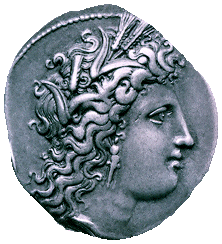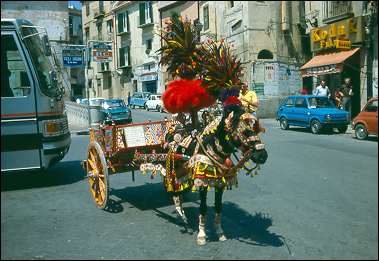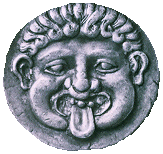|
Books
Purchase the following lively ancient fictions and 1 critical survey at the
bookstore:
- Menander, The Plays and Fragments, tr. Balme,
Oxford
- Petronius, Satyrica, Penguin, tr. Branham, U. Cal.
- Apuleius, The Golden Ass, tr. Walsh Oxford
- Reardon, B.P. ed. The Collected Ancient Greek Novels, U.Cal. =
CAGN
- Hägg, Th. The Novel in Antiquity, U.Cal. 1983= NA.
Lavishly illustrated
Some xeroxed materials
necessary from the beginning will be available for purchase.
WEEK TOPIC READINGS
- Introductory (Elite & Popular Culture)
-
Ancient Greek and Roman literature NA ch. 1, +
pp.18-32
What
is the novel, novella, romance, etc.? (useful summary)
- The Greek “ideal” novel: Xenophon of
Ephesus
Love, travel, sexual frustration, violence CAGN
125-69
Paradigm, epitome, or worst case of the genre?
- Paradigmatic Antecedents I:
-
Epic: Homer: Folktale and Fiction Ody. 10, 19
(xeroc.)
Sex, Marriage, Witchcraft NA pp. 109-17
- Historiography: Herodotus Hist. Selects.
(xeroc.)
Power, conflict, sexual bargains [slides]
- Antecedents II:
-
Stage & Drama: Menander’s ComedyThe
Grouch
Bourgeois bargains
- People pawns The Samian Woman
Power, conflict, sexual bargains [slides]
[Also Euripides’ Tragedies (e.g., Alcestis) &
Aristotle]
- Antecedents III:
-
Pastoral poetry: Theocritus: fantastic & sordid love NA
121-24; Idylls (xeroc.)
- Outlines: Parthenius: Erotic Agonies quiz?? Selected
Pathemata
-
Hellenistic
Epic: Ovid: Metamorphosis = Pseudo-Salvations Metam. xi,
Ceyx & Alcyone
- A Roman “realististic” novel, Imperial I (Neronian) Introd.
xi-xxxvi;
-
Petronius: Satire & Picaresque literature Satyricon, pp.
3-22
- Hero/Anti-Hero; unreliable narrator(s) Sat. Pp.
23-73.
- Petronius II: Trimalchio's Party and Roman life NA
166-76
-
A big world full of bad luck Sat. 75-107,
107-129
- Focalization, mimesis, diegesis Sat. 129-52; Fellini
Satyricon?
- Greek Romance of the Roman Imperial Era
-
Longus: Daphnis & Chloe. CAGN
285-348
Pastoral Idyll? or Sexual Violence? NA 35-41,
214-27
- Construction of gender and identities Feminist criticism
- Lucian, Satirical Sceptic in a Credulous World [[no class
Monday]]
-
A True History: sci-fi, satire, history? CAGN
614-49
cf. Antonius Diogenes, Wonders beyond Thule CAGN
775-82
[cf. Ps. Callisthenes Alexander Romance] NA 118-21,
[125-40]
- The Ass: Donkey-tales, picaresque pornography. CAGN
589-61
++++++Spring BREAK 2008 (8-16 March )+++++++++(Harlequin?)++++++++++
- The Roman Novel II: Apuleius (I) Metamorphoses or The Golden Ass
- Metamorphic Magic, Beasts, Sex, Laughs , Death GA Pref. & Book I
GA II & III
- Existential isolation: A world of frauds and charlatans GA IV.1-27
- Apuleius (II) & Transmogrification (Intertextuality)
- Brutality of reality; Curiosity; Insets & Frame GA IV.28-VI.24
Cupid & Psyche; Insert tales in the Golden Ass + [NA 181-89]
- Strange worlds and bestial societies (coercion, humiliation) GA VI.25-VII
- This nasty world GA VIII
- Apuleius’ (III) Meaning(s)
- Philosophical reflection or Religious propaganda? GA IX-X
- Literary magic: detectives, narrators, readers’ responses GA XI
- Summary and InterpretationS Quiz?
- Transformations & Queer Appropriations of Pagan literature NA 154-65
- Hebrew Bible Novellas Joseph, Susannah, Daniel
- Christian Bible Gospels, Acts, & Novellas Acts, Paul & Thecla (xeroc.)
Ps.-Clementines, Perpet
++++++++++++Thanksgiving Break 19-27 November++++++++++++++++++++
- Heliodoros Aethiopika: “The Most Ambitious Ancient Novel” CAGN
- Heliodorus and the Wilds of Egypt: in medias res Bks. 1-2, pp. 349-409
- Svengali Calasiris; Plotting Bk. 3 pp. 409-24; NA 54-73
- Religion in the Aethiopika; Delphi Bk. 4 pp. 425-45
- Setting, Plotting, Character (s)
- Escape & Capture; Rings Bks. 5-6 445-87
- Arsake/ Potiphar’s Wife Bk. 7 488-516
- Genre Mixing: Epic, Comedy and Tragedy Bks. 8-9 516-58
- Heliodorus, the Late Greek Novel III CAGN
- Setting, Character and Plot Bk. 10 558-88
- Successes & Failures of the Ancient Novel. Review all.
- Reading day Questions?
A few questions that should be asked frequently:
- What and whom was the ancient novel for? What did it do for "them" & does it do for "us"?
- To whom do things happen? How and Why?
- Do novels affirm or question protocols of gender and class—or both?
- How does the ancient novel enlarge our understanding of antiquity? of humanity?
- How is the modern (low and high brow) novel different?
Grading requirements (Spring 2008)
:::::::::::::::::::::(based on 1,000 points total; subject to modification):::::::::::::::::::
- Midterm examination: 200
- Final Examination: 200
- Critique of Article : 100
- Critique of Book or Cinema: 100
- Attendance with intelligent class participation: 100
- Term Paper: 300 (100 per stage: Outline/Sketch; Oral report; Final)
You will receive a special sheet of instructions for this as well as a page of directions on how to edit properly your prose to a high academic standard.
- Extra credit: relevant papers (two max.) can receive up to 25 points each.
This paper might evaluate–using the issues brought up in HMCL 250—any of the following: another relevant movie (Spartacus, A Funny Thing Happened on the Way to the Forum, Gladiator, Troy), an extra ancient text (Lucian's Alexander or the False Prophet is hilarious), a lecture on campus (or off) relevant to understanding the ancient world, or a work of modern criticism (e.g., H. Bloom's The Anxiety of Influence) not used for your other papers. See paper critique form in syllabus.
Your presence for 44 classes is expected. Three absences at most are "forgiven," but after that your grade is adjusted downwards 1/3 letter (or 33 points). Thus, an A- becomes a B+ for three more absences, and so forth for every three. To be excused from attendance, you need a note in advance from the authorities (surgery, varsity sports event), or, for unforeseeable events, some proof afterwards (obituary, hospital statement, etc.)
Plagiarism ughh! (from the Roman arena, really!): Please familiarize yourself with the OWU Student Handbook and the OWU Catalogue so as to understand this distressing topic: theft of another's words, ideas, research, and results. Recently, in part because of the WWW, more cases of inappropriate borrowed material have appeared in college papers. This may amount to small unacknowledged quotations, or major theft of ideas, paraphrased structures, etc. Never hesitate to bring up the propriety of citation or how to cite a source. I hope never to see another case, but I will penalize PLAGIAT by failure in course. Careers in and after college can be ruined by dishonesty.
Any one else' work, published, shared in class, mounted on the web, etc. needs to be cited/ referenced/ acknowledged. When in doubt, credit the source—ancient or modern. Don't worry about too many reff. When citing a WWW source, follow the OWU handbook and include the date of your browse, such as:
Peter Cochrane, “Picture a World of Fewer Words,” Daily Telegraph (London), 22 April 1997: “Petronius Arbiter (60 AD) observed that the most important message is the least expected.” Niall Slater spotted this quotation attributed to Petronius and wrote to the author of the article, Peter Cochrane who replied to Slater: “This quote came out of some lectures by Prof. Cattermole at Essex University 20 years ago!” Slater discovered that there is no Prof. Cattermole at Essex University today. On other apocryphal quotations from Petronius (“Reorganisation”), see PSN 25 (1995) 5, 18. It seems likely that Prof. Cattermole was thinking of something like (55.3): quod non expectes, ex transverso fit et supra nos Fortuna negotia curat.*
* Found at http://chss2.montclair.edu/classics/Petronius/PSN98.html
|




